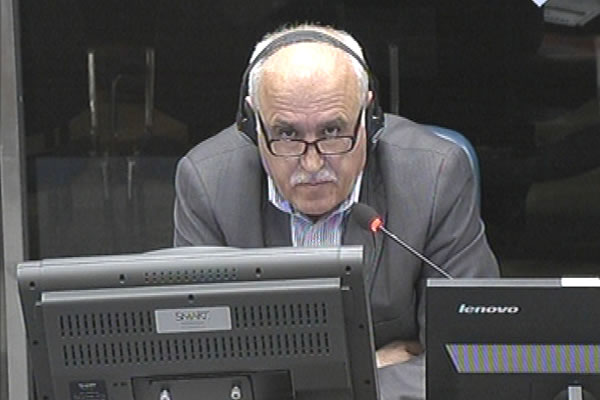Home
WAR CRIMES COMMITTED BY 'OUT OF CONTROL INDIVIDUALS'
President of the Kljuc Crisis Staff Rajko Kalabic admitted at Ratko Mladic's trial that war crimes had happened in the village of Velagici. According to Kalabic, the crimes in Velagici ‘were not planned’. The crimes were committed by 'individuals who were out of control and not acting on anyone's orders', as were many other crimes against the non-Serbs. There was no forcible removal of the non-Serbs from the Kljuc municipality, the witness argued, despite the fact that only 1,000 Muslims remained there. Before the war, 17,500 Muslims lived in the municipality
 Rajko Kalabić, defence witness at Rako Mladic trial
Rajko Kalabić, defence witness at Rako Mladic trial Rajko Kalabic, member of the Serb Crisis Staff in Kljuc, testified at the trial of Ratko Mladic. In the examination-in-chief the witness introduced himself as the former head of the Sip forestry company. As the witness explained, all of the posts he held during the war were 'volunteer work'. He was the president of the Crisis Staff and held a seat first in the BH Assembly and then in the assemblies of Republika Srpska and of the Autonomous Region of Krajina. In his written statement, Kalabic claimed that the SDA was to blame for the war because it ‘planned’ the attacks on the police patrol and the column of soldiers returning from military service on 27 May 1992.
In the examination-in-chief Kalabic said that he had been told about the incident in Velagici the very same day at a Crisis Staff meeting. On 1 June 1992, more than 100 Muslim detainees were killed in the village. At the request of Colonel Stanislav Galic, two buses were dispatched to Velagici to transfer the prisoners to Manjaca. However, a half an hour later the bus drivers came back and reported that the prisoners had been killed. Kalabic also noted that the perpetrators were arrested and prosecuted on Galic’s orders.
Prosecutor Arthur Traldi said in the cross-examination that the bodies of the victims killed in the Velagici school were recovered after the war from the mass grave in Laniste. The Velagici school had been blown up, the prosecutor noted. As the prosecutor put it, the Velagici example was just one of the many ‘horrible war crimes’ showing that the Muslim civilians were not treated ‘in line with the law’,contrary to what the witness claimed in his statement to the defense. Muslims from Kljuc were detained and abused in the local police station and in the Nikola Mackovic school. The school was just a few meters away from the Crisis Staff headquarters. In the attack of the Serb army on the village of Prhovo in June 1992, the victims included the women, children and the elderly.
Kalabic agreed with the prosecutor that a war crime had happened in Velagici. However, the witness stressed that it had not been planned. It was committed by individuals who were not acting on anyone's orders and who were duly ‘prosecuted’. Kalabic claimed he didn’t know that the perpetrators of the massacre were released soon after their arrest and that no-one was actually convicted of the crime. Kalabic likewise argued that the prisoners had suffered abuse at the hands of individuals and that the municipal officials tried to put a stop to the abuse. When the prosecutor confronted Kalabic with his evidence in the Radoslav Brdjanin case, Kalabic confirmed that such incidents ‘were frequent’.
In his answers,Kalabic avoided saying that the Serb troops committed the crime in Prhovo on 1 June 1992. The prosecutor asked the witness if he knew that women, children and the elderly were killed in Prhovo. Kalabic replied that he ‘learned what had happened in Prhovo’. When Judge Orie asked the witness the same question, Kalabic replied, ‘what happened in Prhovo is that a number of women and children were killed’. The witness went on to describe how an unidentified officer entered the Crisis Staff office. He was crying as he reported to Galic that he had lost control of other members of the unit after a military policeman was killed during a search in Prhovo. The members of the unit ‘did what they did’, Kalabic noted. When the judges asked Kalabic if anyone was punished for the Prhovo massacre, he responded that he didn’t know and that he didn’t deal with that.
In his statement Kalabic mentioned that the non-Serbs left Kljuc voluntarily. This prompted the prosecutor to confront Kalabic with a Crisis Staff decision issued on 4 June 1992. The decision states that the municipal authorities will allow those who agree to depart 'for good' to leave. Kalabic tried to explain that the term ‘for good’ was ‘in fact used to persuade people to stay’. Just how successful that ploy of the Crisis Staff was, was best reflected in the fact that by the end of the war, about 1,000 Muslims remained in the Kljuc municipality of the 17,500 pre-war population.
Linked Reports
- Case : Mladic
- 2015-01-19 WHY AND WHEN DID MUSLIMS LEAVE PRIJEDOR?
- 2014-12-18 HEAD OF MLADIC’S INFORMATION SERVICE CLAIMS HE DID NOT RECEIVE INFORMATION
- 2014-12-17 THIN LINE IN MLADIC WITNESS'S HEART
- 2015-01-22 ‘NO ONE TOUCHED MUSLIMS IN KLJUC’
- 2015-01-23 ‘PROTECTION’ OF MUSLIMS IN KLJUC
- 2015-01-23 GENERAL MLADIC’S ‘FLOWER GARDEN’
